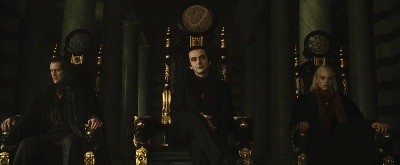Over the past several years, I have been struck by something each time I read King Benjamin’s speech in Mosiah 2-6 to the combined Mulekites[1] and Nephites. Benjamin begins his speech with a long list of negatives, that is, things that he has not done during his reign as king. These include (Mosiah 2:10-16):
- causing the people to fear him
- presenting himself as “more than a mortal man”
- seeking gold, silver, or “any manner of riches” from the people
- confining them in dungeons
- allowing them to make slaves of one another
- allowing them to murder, plunder, steal, and commit adultery
- levying taxes upon them
- boasting of his own accomplishments
- accusing the people of their own alleged failings.
Let’s look at the context of these comments. Benjamin’s father, Mosiah1, led the Nephites who would follow him out of the land of Nephi and ultimately into the land of Zarahemla, which was already occupied by the Mulekites and ruled over by a man named Zarahemla. There were only about half as many Nephites as there were Mulekites, and the two groups did not share a common language, yet Mosiah1 was made ruler over the combined people, and we hear no more about Zarahemla (though one of his descendants, Ammon, leads the group that goes to the land of Lehi-Nephi to see what happened to Zeniff’s party).
I have come to wonder if Benjamin, in preparing to extend his family’s dynasty by proclaiming his son Mosiah2 as the third successive Nephite king over the combined factions (in which the Nephites were still a minority), was drawing a contrast between how he (and presumably his father) had ruled vs. how the Mulekite kings (or, at least, Zarahemla) had ruled. After all, if neither Benjamin nor Mosiah1 had done any of these things — the rule of these two kings covering a period of what appears to be at least a few decades — why would Benjamin have felt compelled to start off his address with these reminders? So I think that Benjamin was reminding the combined people, and the Mulekites in particular, how much better things were under the Nephite kings than their previous ruler(s).
One could reasonably argue that Benjamin was instead drawing a contrast between himself and whomever was ruling over the Nephites in the land of (Lehi-)Nephi up until the time when Mosiah1 led a faction of the Nephites away from there over to Zarahemla, and that could well be true. But that comparison would have no real meaning for the Mulekites, who made up roughly 2/3rds of the population, while the Nephite portion of the population were all individuals (or descendants thereof) who had chosen to follow Mosiah1 away from those rulers.
Instead, I believe that the contrast — if that was in fact what Benjamin was doing — was with the prior Mulekite regime. In other words, I think the list above was a not-so-subtle reminder from Benjamin of how things had been for the Mulekites prior to Mosiah1‘s arrival and how they might be again if Mosiah2‘s coronation is not accepted.
If this does reflect how things were under Mulekite rule, it helps explain why the Mulekites, or a sufficiently large segment thereof, were willing to have Mosiah1 — accompanied by a smaller group of foreign people speaking a foreign tongue and practicing a foreign religion — show up and rule over them, without any apparent military conquest.
It also explains, or at least provides context for, the subsequent problems and wars over the next 160 years. Most of those problems/wars are caused by “Nephite dissenters” (many of whom I suspect are Mulekites) who work and fight constantly to (re)establish an authoritarian and self-indulgent kingship, in contrast to the Christ-like reign of the Mosiah1 lineage, followed by the reign of the judges. In other words, Benjamin may well have been warning the people, Mulekites and Nephites combined, against the temptation of such a regime. And it will be his successor, Mosiah2, who will abolish the Nephite kingship entirely, in part I believe in reaction to Alma and Limhi leading their respective groups into Zarahemla and telling the tale of King Noah — but likely also due to the “king men” faction present in the Mulekite/Nephite population.
———————
[1] The term “Mulekites,” of course, never appears in the Book of Mormon text itself, but it is useful shorthand for “the people living in Zarahemla (and relevant outlying regions) at the time Mosiah and his Nephite followers happened upon them .”

